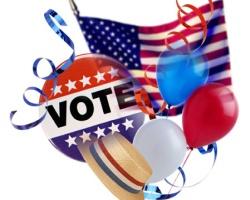My high school history teacher used to say, “Every four years, we have an election, whether we need one or not.”
So whether we needed it or not, the 2008 election is behind us; later this month, we will be swearing in our new president. Depending on your political background and how you voted, you might now feel so relieved that the right person was elected; or you might feel like the country is doomed because of that no-good, rotten excuse for a candidate that they (not you) just elected. Regardless, set aside your own preference to think about how students interact with politics.
High school students are often apolitical. I distinctly remember a conversation with a good friend in high school who uttered the sad words, “Why should I even bother voting? It’s just one vote. What difference does it make?” Because I was that strange kid who had a unique interest even in local politics, I was shocked and dismayed. I gave my friend a list of all of the city council members she should vote for in the election that spring.
High school students often don’t know (and often don’t care) about politics because they’re not yet old enough to vote. Is it important for us to help them in this? I think so.
Jim Wallis has done a fine job of challenging the notion that American evangelicals always should support whichever candidate has the “Christian” view on abortion and homosexuality. Those are two important issues, to be sure, but the Bible has a lot to say about many issues, not just those two. In the past 30 years, especially with the emergence of the Religious Right, evangelical Christians have become “automatic Republicans.” However, younger believers care less about voting the way “all the other Christians do” and more about asking which candidate will be a better leader, which candidate has the character to go along with his or her platform, which candidate has the experience to get the job done.
Granted, we must communicate to students there is no candidate who can change our country or world like Jesus can. As Derek Webb sings, “My first allegiance is not to a flag, a country, or a man…It’s to a King and a Kingdom.” There is only one Savior, only one King. That doesn’t mean we can’t, or shouldn’t, make a difference in the political realm. Students should be encouraged not to become jaded by the government. Individual people can make a difference.
I’m inspired by Jesus’ parable in
Speaking of movies, invite them over to watch Jimmy Stewart in Mr. Smith Goes to Washington. It’s an inspiring story about how an average guy can make a difference in the world of politics.
More ideas to help your students get involved include:
Register.
• Make sure they register to vote if they are 18. This is a privilege that millions in the world do not enjoy.
Get Involved.
• Encourage them to sign up on the Web site www.one.org, where they can receive e-mails inviting them to contact elected officials and sign petitions related to issues of global poverty.
Think About It.
• Plant seeds of thought that students could serve their country as elected officials some day because we need more Christian politicians. Of course, don’t forget to laugh. If you need help laughing, go to www.nbc.com and watch classic “Saturday Night Live” debate spoofs for hours on end.




